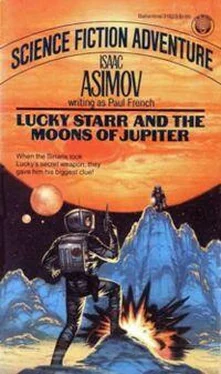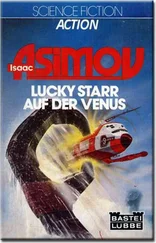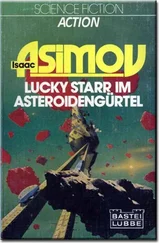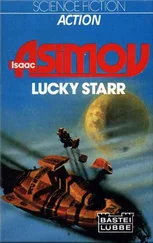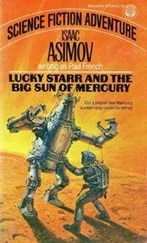Isaac Asimov - Lucky Starr The And The Moons of Jupiter
Здесь есть возможность читать онлайн «Isaac Asimov - Lucky Starr The And The Moons of Jupiter» весь текст электронной книги совершенно бесплатно (целиком полную версию без сокращений). В некоторых случаях можно слушать аудио, скачать через торрент в формате fb2 и присутствует краткое содержание. Год выпуска: 1984, ISBN: 1984, Издательство: Ballantine Books, Жанр: Фантастика и фэнтези, на английском языке. Описание произведения, (предисловие) а так же отзывы посетителей доступны на портале библиотеки ЛибКат.
- Название:Lucky Starr The And The Moons of Jupiter
- Автор:
- Издательство:Ballantine Books
- Жанр:
- Год:1984
- ISBN:SBN 0-345-31623-1
- Рейтинг книги:5 / 5. Голосов: 1
-
Избранное:Добавить в избранное
- Отзывы:
-
Ваша оценка:
- 100
- 1
- 2
- 3
- 4
- 5
Lucky Starr The And The Moons of Jupiter: краткое содержание, описание и аннотация
Предлагаем к чтению аннотацию, описание, краткое содержание или предисловие (зависит от того, что написал сам автор книги «Lucky Starr The And The Moons of Jupiter»). Если вы не нашли необходимую информацию о книге — напишите в комментариях, мы постараемся отыскать её.
Lucky Starr The And The Moons of Jupiter — читать онлайн бесплатно полную книгу (весь текст) целиком
Ниже представлен текст книги, разбитый по страницам. Система сохранения места последней прочитанной страницы, позволяет с удобством читать онлайн бесплатно книгу «Lucky Starr The And The Moons of Jupiter», без необходимости каждый раз заново искать на чём Вы остановились. Поставьте закладку, и сможете в любой момент перейти на страницу, на которой закончили чтение.
Интервал:
Закладка:
Lucky nodded. On impulse he moved rapidly in Norrich's direction. Io's gravity was just a trifle over that of the moon, and both he and Bigman could handle that neatly.
A few long, flat strides did the job. "Norrich," said Lucky, shifting to the engineer's wave length.
One cannot tell direction of a sound when it comes out of earphones, of course, and Norrich's blind eyes looked about helplessly. "Who is it?"
"Lucky Starr." He was facing the blind man, and through the face-plate could make out clearly the look of intense joy on Norrich's face. "You're happy to be here?"
"Happy? You might call it that. Is Jupiter very beautiful?"
"Very. Would you want me to describe it to you?"
"No. You don't have to. I've seen it by telescope when-when I had eyes, and I can see it in my mind now. It's just that… I don't know if I can make you understand. We're some of the few people to stand on a new world for the first time. Do you realize what a special group that makes us?"
His hand reached down to stroke Mutt's head and contacted only the metal of the dog's helmet, of course. Through the curved face-plate, Lucky could see the dog's lolling tongue, and his uneasy eyes turning restlessly this way and that, as though disturbed by the strange surroundings or by the presence of his master's voice without the familiar body that went with it.
Norrich said quietly, "Poor Mutt! The low gravity has him all confused. I won't keep him out much longer."
Then, with an increase of passion again, "Think of all the trillions of people in the galaxy. Think how few of them have had the luck to be the first on a world. You can almost name them all off. Janofski and Sterling were the first men on the moon, Ching the first man on Mars, Lubell and Smith on Venus. Add them all up. Even count in all the asteroids and all the planets outside the solar system. Add up all the firsts and see how few there are. And we're among those few. I' m among those few."
He flung his arms out as though he were ready to embrace the whole satellite. "And I owe that to Summers, too. When he worked out a new technique for manufacturing the lead contact point-it was just a matter of a bent rotor, but it saved two million dollars and a year's time, and he not even a trained mechanic -they offered to let him be in the party as reward. You know what he said. He said I deserved it in his place. They said sure, but I was blind, and he reminded them why I was blind and said he wouldn't go without me. So they took us both. I know you two don't think much of Summers, but that's what I think of when I think of him."
The commander's voice sounded ringingly in all helmets: "Let's get to work, men. Jupiter will stay where it is. Look at it later."
For hours the ship was unloaded, equipment was set up, tents unfurled. Temporary air tights were prepared for possible use as oxygen-supplied headquarters outside the ship.
The men were not to be kept from watching the unusual sky, though. As it happened, all three of Jupiter's other large satellites were in the sky.
Europa was closest, appearing somewhat smaller than Earth's moon. It was a crescent, near the eastern horizon. Ganymede, appearing smaller still, was nearer zenith and half full. Callisto, only a quarter the width of Earth's moon, was nudging close to Jupiter and, like Jupiter, was some two thirds full. All three together gave not one quarter the light of Earth's full moon and were completely inconspicuous in the presence of Jupiter.
Bigman said exactly that.
Lucky looked down at his small Martian friend after having studied the eastern horizon thoughtfully. "You think nothing could beat Jupiter, do you?"
"Not out here," Bigman said stoutly.
''Then keep watching," said Lucky.
In Io's thin atmosphere there was no twilight to speak of and no warning. There was a diamondlike sparkle along the frost-covered top-line of the ridge of low hills, and seven seconds later the sun had topped the horizon.
It was a tiny seed-pearl of a sun, a little circle of brilliant white, and for all the light that giant Jupiter cast, the pigmy sun cast much, much more.
They got the telescope up in time to catch Callisto vanishing behind Jupiter. One by one, all three satellites would do the same. Io, although it kept only one face to Jupiter, revolved about it in forty-two hours. That meant that the sun and all the stars seemed to march around Io's skies in those forty-two hours.
As for the satellites, Io moved faster than any of them, so it kept overtaking them in the race about Jupiter. It overtook the farthest and slowest, Callisto, most rapidly; so Callisto circled Io's heavens in two days. Ganymede took four days and Europa seven. Each traveled from east to west and each in due turn was to pass behind Jupiter.
The excitement in the case of the Callisto eclipse, which was the first to be witnessed, was extreme. Even Mutt seemed to be affected by it. He had grown increasingly used to low gravity, and Norrich gave him periods of freedom during which he floundered grotesquely about and tried vainly to inspect by nose the numerous strange things he encountered. And in the end, when Callisto reached Jupiter's glowing curve and passed behind, and all the men grew silent, Mutt, too, sat on his swathed haunches and, tongue lolling, stared upward at the sky.
But it was the sun they were really waiting for. Its apparent motion was faster than that of any of the satellites. It gained on Europa (whose crescent thinned to nothingness) and passed behind it, remaining in eclipse for something less than thirty seconds. It emerged, and then Europa was a crescent again, with its horns facing in the other direction now.
Ganymede had plunged behind Jupiter before the sun could reach it, and Callisto, having emerged from behind Jupiter, was below the horizon.
It was the sun and Jupiter now, those two.
The men watched greedily as the seed-pearl sun climbed higher in the sky. As it did, Jupiter's phase grew narrower, its lighted portion always, of course, facing the sun. Jupiter became a "half-moon," then a fat crescent, then a thin one.
In Io's thin atmosphere the sunlit sky was a deep purple, and only the dimmer stars had been blotted out. Against that background there burnt the gigantic crescent in the sky, bulging out toward the relentlessly approaching sun.
It was like David's pebble hurled from some cosmic slingshot toward Goliath's forehead.
The light of Jupiter shrank still further and became a yellowish curved thread. The sun was almost touching.
It did touch and the men cheered. They had masked their face-plates in order to watch, but now that was no longer necessary, for the light had dimmed to bearable dimensions.
Yet it had not vanished entirely. The sun had moved behind the edge of Jupiter but it still shone murkily through that giant planet's thick, deep atmosphere of hydrogen and helium.
Jupiter itself was now completely blanked out, but its atmosphere had sprung to life, refracting and bending the sunlight through itself and around the curve of the planet, a smoothly bending film of milky light.
The film of light spread as the sun moved farther behind Jupiter. It curved back on itself until faintly, very faintly, the two horns of light met on Jupiter's other side. Jupiter's vanished body was outlined in light and one side bulged with it. It was a diamond ring in the sky, big enough to hold two thousand globes the size of the moon as seen from Earth.
And still the sun moved farther behind Jupiter so that the light began to fade and grow dim, and dimmer, until finally it was gone and, except for the pale crescent of Europa, the sky was black and belonged to the stars.
"It will stay like this five hours," said Lucky to Big-man. "Then everything will repeat itself in reverse as the sun comes out"
Читать дальшеИнтервал:
Закладка:
Похожие книги на «Lucky Starr The And The Moons of Jupiter»
Представляем Вашему вниманию похожие книги на «Lucky Starr The And The Moons of Jupiter» списком для выбора. Мы отобрали схожую по названию и смыслу литературу в надежде предоставить читателям больше вариантов отыскать новые, интересные, ещё непрочитанные произведения.
Обсуждение, отзывы о книге «Lucky Starr The And The Moons of Jupiter» и просто собственные мнения читателей. Оставьте ваши комментарии, напишите, что Вы думаете о произведении, его смысле или главных героях. Укажите что конкретно понравилось, а что нет, и почему Вы так считаете.
